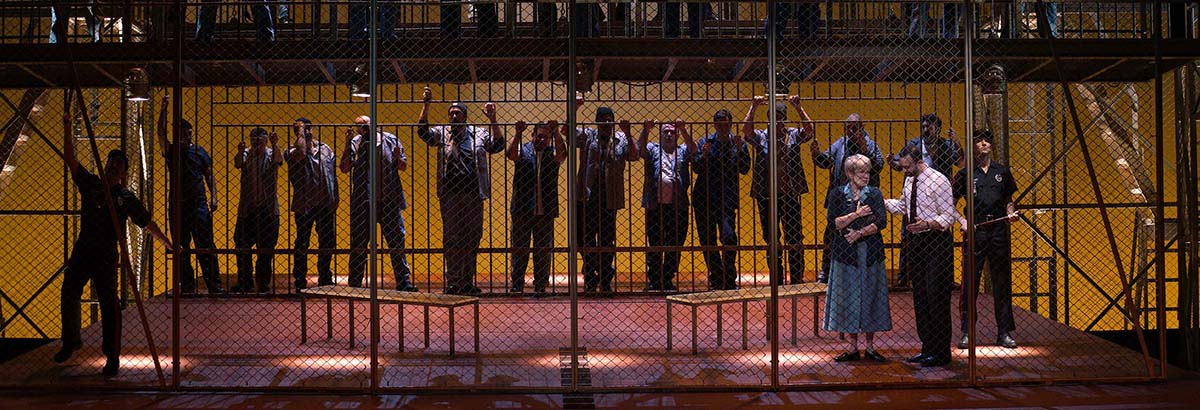September 24, 2019
Sister Helen Prejean on DEAD MAN WALKING
It’s been nearly two decades since the powerful story of the Louisiana nun who became spiritual adviser to a condemned man first premiered on the opera stage. First a New York Times best-selling book, then an Academy Award-winning film, Dead Man Walking is now the most often-produced opera of our generation. The ongoing emotional resonance of this gripping story is undeniable.
This essay is excerpted from Lyric’s program book for Dead Man Walking, which will have its long-awaited company premiere on November 2.
By Sister Helen Prejean
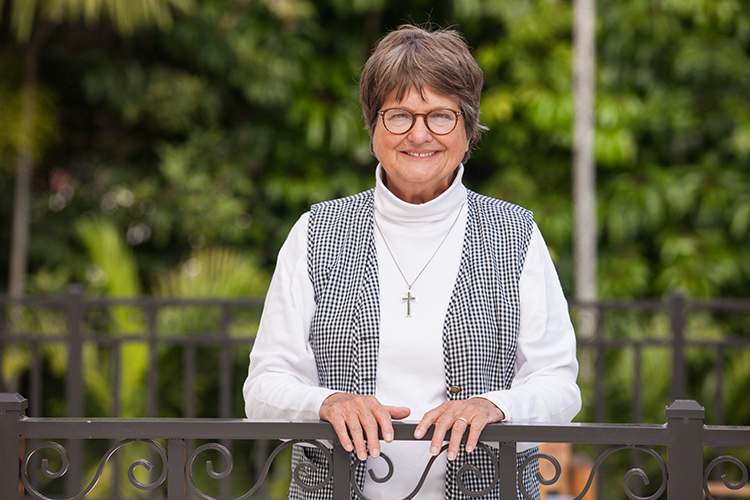
Thursday, January 28, 1999. I’m at Swarthmore College in Pennsylvania, watching the audience file into the auditorium for my lecture. Someone touches my arm and says there is a man wanting to meet me. I turn and see a young man with a skimpy goatee and I immediately think, “He’s an ex-prisoner.” Happens all the time in my line of work. He comes toward me, his hand extended, and introduces himself....“I’m auditioning for the opera Dead Man Walking,” he tells me, and I smile. I know immediately that he will be perfect for the role of Joseph De Rocher.
That is how the whole opera version of my book Dead Man Walking came together – the pieces just falling into place one by one. The key people getting involved as if drawn in by some force. Not just a force to make a successful modern opera, but a force strong enough to actually take people on a journey. The music and the words are so powerful that audiences find themselves walking down the path taken by my character – and that path travels through both the brightest and the darkest aspects of our humanity. It’s a difficult path to take, I know, and there are moments of discomfort, heartache, and outrage along the way. But it’s an important path to travel. I look forward to being with the people of Chicago as they take this journey.
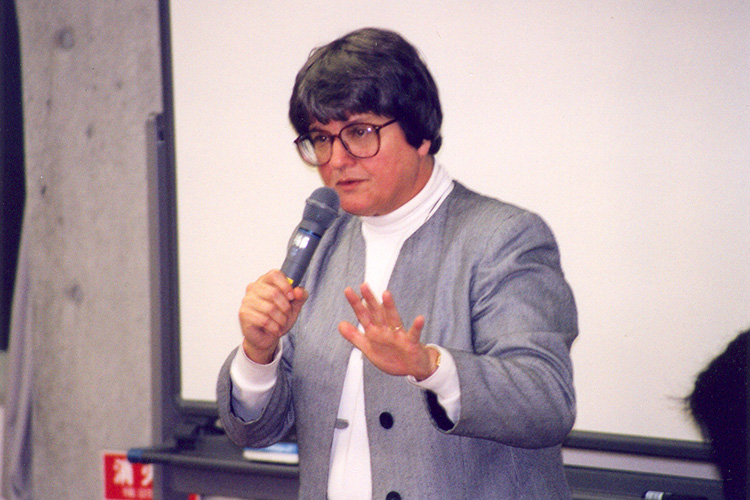
[When] the opera was coming together, Jake Heggie and Terrence McNally shared the libretto and snippets of the music with me. I told them...that as long as they captured the theme of redemption, I would be satisfied. In the end, I was more than satisfied. They captured the feel and the struggle of my own spiritual journey, and…gave us a glimpse at the lives of death row inmates and murder victims’ families. It is so much more than an opera about redemption: it is a window to a whole new world for most people, and it shows all sides of the issue. The savage and heinous crime is not ignored, but fully revealed. The emotional pain experienced by the family members of the victims is explored. Dead Man Walking is an artistic reflection on what happens behind the scenes, away from the public eye, when we as a society condemn and execute a person.
A true work of art is one that brings people to a deeper level of reflection. William Faulkner, when he received the Nobel Prize for literature, said that the only thing worth writing about is the conflict in the human heart. True art brings you to both sides of a conflict. Through Dead Man Walking, I see audience members going to a deeper place within themselves. We see a murderer, and then we see an execution. Are they essentially the same thing, or are they different? Is that the only way to respond as a society, or are there alternatives? The opera shows us we can look at different options in regards to using the death penalty. Art helps us explore alternatives, allows us to make new choices, and brings us to a deeper place where all this reflection can happen. This opera is particularly helpful as audiences navigate the moral dilemmas that surround capital punishment.
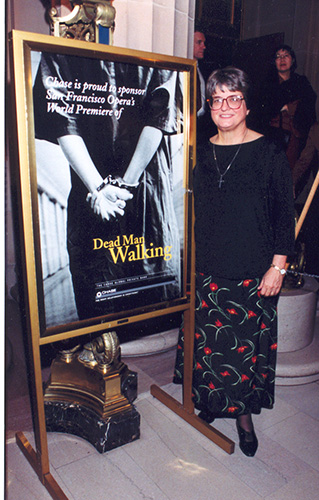
In more than 20 years of...speaking tours, I have realized that the American people are ready to talk about the death penalty. They need someone to take them through the discussion. The book Dead Man Walking was my first opportunity to do this. I was pleased when the film was made by Tim Robbins, Susan Sarandon, and Sean Penn, because I knew we were going to have a new, tangible way to help the American people reflect on the death penalty. It’s a moral issue that is not discussed very often, but I think people are more ready for deeper spiritual reflection than we give them credit for.
To reach out to people, you have to tell stories. This is one of the reasons I think Dead Man Walking in all its forms touched so many people, because in my stories I allowed people to see how it was for me, and for the inmate, and for the families involved. It was hard….But I know that it is through this baring of the soul that people – who would otherwise never be caught up in our capital punishment system – will come to understand just how the system works, and how it prolongs the grieving and suffering of all the families involved.
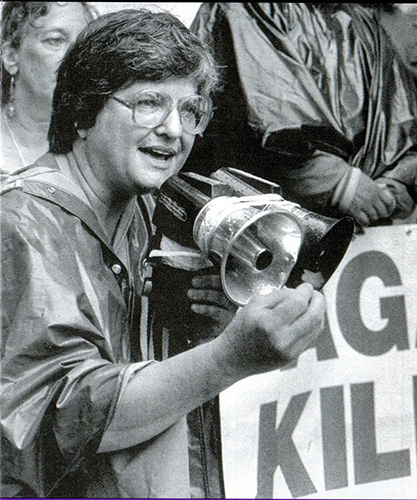
The opera was the next logical step in the unfolding of my story. We know that music can change consciousness and music can open up parts of our hearts we don’t even know we have. Music also brings about healing and connectedness among human beings. Composer Jake Heggie was incredibly aware of this fact. In the opera, “You Don’t Know What It’s Like” is an ensemble sung by both victims’ and death row families and it demonstrates the common unifying experience of suffering and loss. Also, Jake allowed a spiritual hymn – “God Will Gather Us Around, All Around” – to thread through the story, without resorting to the stereotypes we often see when nuns are portrayed. His sensitivity to the issues and emotions involved make it a stronger and truer production.
These days, I am still on the journey. Speaking out about what I have witnessed comes naturally to me. There are many roads taken as I travel the world, giving talks to help people see the system for what it really is, and offering alternatives if they’re ready to change things….It’s a journey. I thank the people of Chicago for joining me in it.
Adapted from an article that originally appeared in the program of New York City Opera.
In addition to Dead Man Walking, Sister Helen Prejean is the author of The Death of Innocents: and Eyewitness Account of Wrongful Executions, and River of Fire: My Spiritual Journey, released in September.
The opportunity to hear from Sister Helen Prejean directly is an amazing way to prepare to fully experience Dead Man Walking. You can get a taste of her power and dynamism by glimpsing at this conversation with the opera's composer, Jake Heggie, taped earlier at Lyric.
